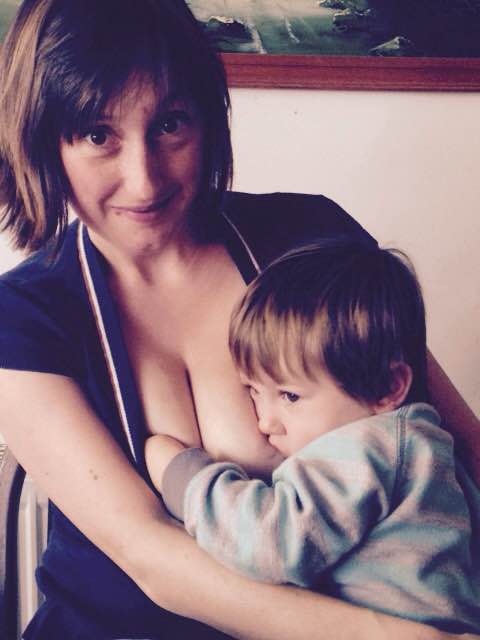
Scenario 1: Your eight-month-old seems to be teething. He bit you while nursing and you screamed at the top of your lungs (ouch!). Now your baby cries when he comes to your breast, and refuses to nurse.
Scenario 2: Your four-month-old had a cold last week and was too stuffed up to nurse. Then you had a busy week—lots of plans out of the house—and your baby wouldn’t sit still to nurse while you were out. Today she arches away from the breast every time you sit down to nurse. You were already stressed out and now your stress is skyrocketing.
Scenario 3: Your fourteen-month-old seems too busy to nurse lately. He’ll sit on your lap, latch for a second, and then run off laughing. He would rather eat snacks or drink water from a sippy cup. Last night you were staying at your in-laws’, and he was restless and pulling off the breast even while nursing to sleep. Today he’s flatly refusing the breast altogether and you are concerned he’s weaning.
Sound familiar? These are just some examples of what might happen if your baby is experiencing a nursing strike.
First, how do you distinguish a nursing strike from weaning? Basically, any baby or toddler who suddenly refuses the breast is having a strike. It doesn’t really matter how old your baby is. Certainly any child under two years won’t just stop nursing suddenly without due cause. Even older toddlers can have nursing strikes. Natural weaning—even if it is pushed along a bit by a mom—happens very gradually, the child dropping nursing sessions one by one, over many weeks or months. So, when in doubt, assume your baby or toddler is having a nursing strike.
The first thing to know is that almost all nursing strikes resolve in time. Babies actually want to nurse, but something is upsetting them when they strike, and once this is resolved or forgotten, nursing will resume. In order to get through the strike, you need some faith, good support, and lots of patience. It can sometimes take a few days (or even weeks, in some cases) to resolve completely.
Even though it might take a bit of detective work, almost all nursing strikes begin with some kind of stressor that make nursing unhappy for your baby. The most common ones are illness, teething, developmental changes (both mental and physical), changes in routine (moving, busy family life), biting (especially if the mother reacts by screaming, and startling the baby), and high-stress situations in the family. Sometimes it’s a little more subtle than these situations, and often is a combination of things that push things over the edge for your baby, and result in a strike.
Remember that something is bothering your baby. It is nothing you did wrong. Even if you screamed while being bitten, or were “too busy” or “too stressed,” there is no reason for guilt here. These things happen in our lives. Like I said before, nursing strikes almost always work themselves out in due time.
So what to do once you have identified it as a nursing strike?
First, it’s important to protect your milk supply and feed your baby. Some babies will refuse the breast completely; others will still nurse for some sessions, but refuse the others. Unless you are dealing with an older toddler, you will need to pump or hand express in order to keep up your milk supply. Your baby needs to be fed the pumped milk to get adequate calories.
It’s preferable to feed your with non-bottle nipples (you can try a small cup or a spoon). If that isn’t possible, and your baby will only take a bottle, try paced bottle feeding to make bottle feeding most compatible with breastfeeding. If your baby uses a pacifier, see if you can use it less, or not at all—some babies will come back to the breast by first using it to pacify, so you don’t want to rely on artificial nipples right now.
Babies who are refusing the breast have a memory of something that happened during breastfeeding that upset them, and you want them to move past this memory. So now isn’t the time to force the breast. Definitely continue offering it—but if your baby cries when you do, this may not be the best strategy.
When your baby gets upset at the sight of your breast, a good strategy is to offer the breast when the baby is less aware of what is happening. My favorite time to do so is just when a baby is waking up from sleep because the baby is in a semi-conscious state then. You can also offer the breast in the middle of a sleep cycle, when the baby stirs. If you don’t already share sleep with your baby, now is a good time to do so, even if it’s just a temporary thing. Sleep without a shirt so your baby will smell you—he or she might latch on without your even knowing.
Lots of skin-to-skin usually helps. You can just hold your baby against your breast periodically without offering, without trying to “make things happen.” You want to remind your baby that the breast is a safe, cozy place. A weekend napping in bed together, skin-to-skin, often cures a nursing strike.
Other tricks include nursing in the dark, nursing in a baby carrier, nursing in the bathtub, or nursing outside. Just changing up the nursing routine can be helpful so that your baby can forget whatever caused the strike.
I highly recommend you talk to a breastfeeding counselor, or an understanding friend. When a baby refuses your breast, it can cause a whole lot of stress for you, and being able to talk it through can be immensely helpful. Often your baby will pick up on the relief in your body, and begin to relax as well, which will help end the strike.
So have faith, take your time, go back to basics, and get tons of support. I know how devastating it is when your baby refuses the breast. It’s hard not to take it as a personal rejection. But it will be OK. It’s just a nursing strike, and will be over soon.
Photo courtesy of www.flickr.com/photos/okbends/
***
A version of this post first appeared in Natural Child Magazine
***
Need some extra breastfeeding help and support? Schedule a virtual lactation consultation with me.



